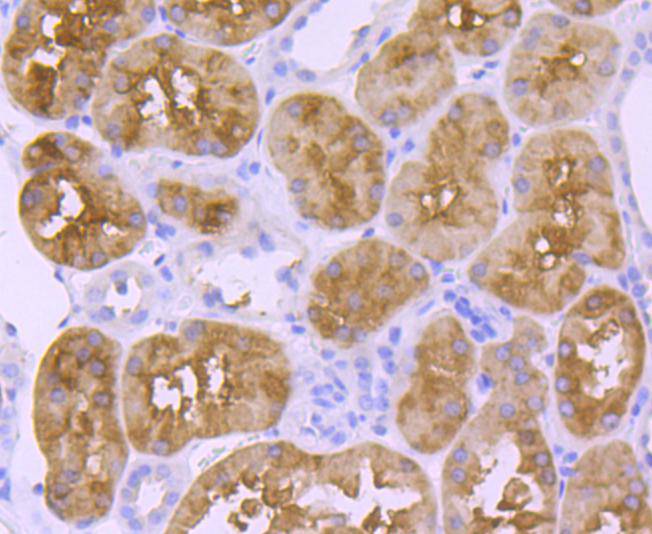Product Detail
Product Name58K Golgi protein Rabbit mAb
Clone No.JF099-5
Host SpeciesRecombinant Rabbit
Clonality Monoclonal
PurificationProA affinity purified
ApplicationsWB, IHC, FC
Species ReactivityHu
Immunogen Descrecombinant protein
ConjugateUnconjugated
Other NamesFormimidoyltetrahydrofolate cyclodeaminase antibody Formimidoyltransferase cyclodeaminase antibody Formiminotetrahydrofolate cyclodeaminase antibody Formiminotransferase cyclodeaminase antibody Formiminotransferase-cyclodeaminase antibody FTCD antibody FTCD_HUMAN antibody Glutamate formiminotransferase antibody Glutamate formyltransferase antibody LCHC 1 antibody LCHC1 antibody
Accession NoSwiss-Prot#:O95954
Uniprot
O95954
Gene ID
10841;
Calculated MW59 kDa
Formulation1*TBS (pH7.4), 1%BSA, 40%Glycerol. Preservative: 0.05% Sodium Azide.
StorageStore at -20˚C
Application Details
WB: 1:500-1:1000
IHC: 1:50-1:200
FC: 1:50-1:100
Immunohistochemical analysis of paraffin-embedded human liver tissue using anti-58K Golgi protein antibody. Counter stained with hematoxylin.
Immunohistochemical analysis of paraffin-embedded human kidney tissue using anti-58K Golgi protein antibody. Counter stained with hematoxylin.
Flow cytometric analysis of HepG2 cells with 58K Golgi protein antibody at 1/50 dilution (red) compared with an unlabelled control (cells without incubation with primary antibody; black). Alexa Fluor 488-conjugated goat anti rabbit IgG was used as the secondary antibody
58K protein antibodies are excellent for use as markers for the Golgi complex. The 58K protein has been identified as being FTCD, a bifunctional enzyme that channels 1-carbon units from formiminoglutamate, a metabolite of the histidine degradation pathway, to the folate pool. Defects in FTCD are the cause of glutamate formiminotransferase deficiency [also known as formiminoglutamicaciduria (FIGLU-uria)], an autosomal recessive disorder. Features of a severe phenotype include elevated levels of formiminoglutamate (FIGLU) in the urine in response to histidine administration, megaloblastic anemia and mental retardation. Features of a mild phenotype include high urinary excretion of FIGLU in the absence of histidine administration, mild developmental delay and no hematological abnormalities.
If you have published an article using product 49394, please notify us so that we can cite your literature.





 Yes
Yes



